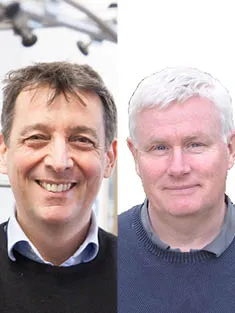Winner: 2020 Rita and John Cornforth Award
Gideon Davies and Paul Walton
University of York
For the team's ground-breaking synergistic studies of lytic polysaccharide monooxygenase enzymes and insights into the copper histidine brace active site.

The world’s richest and most abundant biomass source is cellulose, the material which makes up the bulk of plant matter. Cellulose is comprised of sugars, linked together in polymeric form. If these sugars could be released and then fermented, then cellulose could potentially provide a rich source of sustainable biofuel - so-called cellulosic bioethanol. However, cellulose is a highly recalcitrant material which resists break down into its constituent sugar molecules.
Professor Walton and Professor Davies’ work has concentrated on the enzymes which are found in nature that naturally decompose cellulose. In particular, their studies have concentrated on a recently-discovered set of enzymes called Lytic Polysaccharide Monooxygenases (LPMOs). These enzymes have a complicated structure which they have studied using a technique called X-ray diffraction.
In addition to this, LPMOs use a single copper atom which is contained within their active site, this is essential for activity. The teams’ studies have helped understand how the copper orchestrates the chemistry of the enzyme. They’ve combined their expertise in quantum inorganic chemistry and structural enzymology to show that it activates oxygen from the air and can effectively break the chains of cellulose, making the sugar molecules available to be fermented and turned into fuel.
LPMOs are now used in commercial enzyme mixtures for the generation of cellulosic bioethanol.
Biography
Professor Paul Walton
Professor Paul Walton obtained his PhD in 1990 from the University of Nottingham, followed by two years as a NATO/SERC postdoctoral fellow at the University of California, Berkeley, USA. He joined the Department of Chemistry at York as a faculty member in 1993 and between 2004 and 2010 he was chair of the department.
His main research area is bioinorganic chemistry, in which he has made contributions to the understanding of copper oxidases, including the discovery of the histidine brace. Professor Walton is the recipient of multiple awards, including the Royal Society of Chemistry's Higher Education Teaching Award, the RSC's 2016 Joseph Chatt Award for outstanding multidisciplinary research, the IChemE's Global Award for energy research and the Royal Society's inaugural Athena Prize for gender equality work (runner up). He has also been the editor of Dalton Transactions (2004-2008), chair of Heads of Chemistry UK, chair of the Royal Society of Chemistry's Diversity Committee and is one the RSC's 175 Faces of Chemistry. Paul is an internationally-known advocate of equality in sciences and lectures widely on the subject.
Professor Gideon Davies
Professor Gideon Davies received his PhD from the University of Bristol in 1990, and went on to postdoctoral research at EMBL Hamburg and CNRS Grenoble. He is currently the Royal Society Ken Murray Research Professor at the University of York. Gideon’s main area of research is the chemical and structural biology of carbohydrate-active enzymes. He has pioneered work on the conformational analysis of enzyme mechanism as well as the dissection of enzymes involved in polysaccharide synthesis and degradation. He has won a number of awards including the Davy Medal of the Royal Society.
To solve complex problems we will inevitably need the combined skills of many different people from many different backgrounds. This is why teamwork and equality in science are so important.
Professor Gideon Davies and Professor Paul Walton
Q&A with Professors Paul Walton and Gideon Davies
What motivates you?
The joy of discovery and of working with wonderful people
Why do you think teamwork is important in science?
The problems that we face are complex. To solve these problems, we will inevitably need the combined skills of many different people from many different backgrounds. This is why teamwork and equality in science are so important.